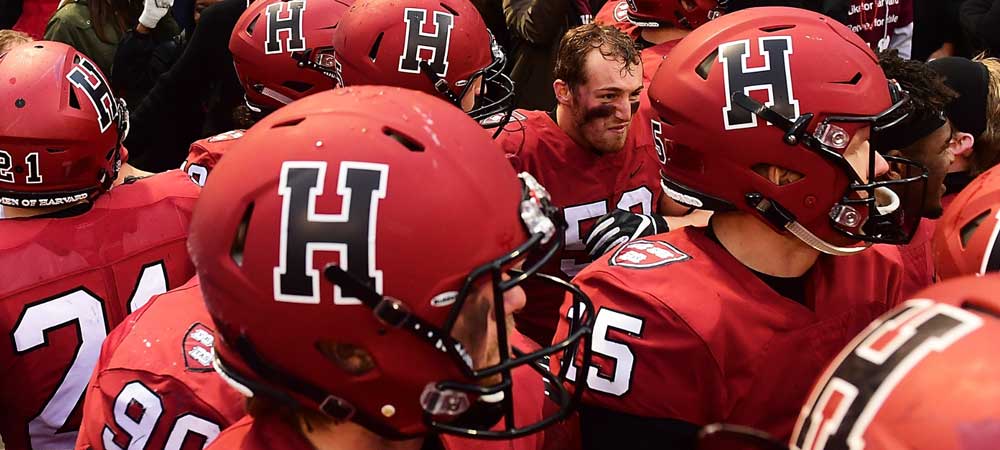- Massachusetts currently has a bill on the table that would make professional and college sports legal to wager on in the Commonwealth.
- A letter issued by multiple colleges in the state has spoken out in opposition when it comes to allowing college sports to be gambled on.
- If both professional and college sporting events were legalized for gambling, the Bay State could see $50 million in annual revenue from the industry.
BOSTON – The Massachusetts Legislature has been in continued discussions over bills that would legalize sports betting in the Commonwealth and colleges statewide have now come together to speak out against allowing their sports programs to be part of any future laws being discussed.
Economic development bills that are meant to help a COVID-19 affected economy are currently on the table with a House Bill allowing for legal sports wagering while the Senate version does not include it in their proposal.
The House believes that gambling on sporting events could bring in an estimated $50 million in revenue each year that would go toward businesses like restaurants, education, and lower-income families that have been severely affected by the Coronavirus Pandemic.
Massachusetts Colleges Not On Board With House Bill
Multiple colleges in Massachusetts came together to sign a letter that they all agreed upon prior to submitting it to lawmakers in the Commonwealth.
Presidents from Boston College, Boston University, Harvard University, Holy Cross, Merrimack College, Northeastern University, and the University of Massachusetts all signed their names to the letter urging the Massachusetts Legislature to rethink any idea of adding collegiate sports to the sports betting menu should the pastime become legal in the Bay State.
“We recognize that during the current difficult economic climate, the Legislature desires to develop new sources of revenue, including sports wagering,” states the letter by the colleges. “But like other states, Massachusetts can gain those benefits without legalizing college sports betting. Such a limitation is necessary to safeguard the longstanding distinctive role and contribution of student-athletes as well as to preserve the integrity of intercollegiate athletics in the Commonwealth.”
Making sports betting legal in Massachusetts is being considered now more than ever for the purposes of funding. The Commonwealth needs new revenue streams to begin to rebuild from the monumental damage the outbreak of COVID-19 has caused.
While the colleges are aware of this, they still believe that making college wagers legal would be detrimental to their institutions.
The letter reads that legalization could harm the integrity of programs at the schools and that colleges do not have the time or money to oversee that no wrongdoing occurs during their sporting events.
They also feel that the temptation may be too great for both students and athletes of the schools that could lead to addictive behaviors along with other mental health issues.
They also mentioned concerns over the financial stability of students being hindered as well as the integrity of games being greatly affected which is the problem that took top billing of each one mentioned within the document.
“Student-athletes could be persuaded that agreeing to limit scoring or committing an ‘unforced’ error would not really matter,” the letter reads. “But doing so clearly harms personal and institutional values, has no place in college sports, and, as history shows, often leads to more corrupt and unethical actions.”
What’s Next?
The House bill is the only one that not only mentions making sports betting legal in Massachusetts but allows for both college and professional wagers. Eilers & Krejcik Gaming, a research firm, concluded that if the Commonwealth prohibits collegiate betting that it would downsize how lucrative the industry could be by 25%.
This would change the yearly revenue to $37.5 million rather than $50 million as the current estimates show.
Sports betting in Massachusetts is a hot topic at the moment and could very well become legal in 2020 with a 2021 launch if it does. However, the Massachusetts Legislature still has plenty of variables to iron out before any final decisions can be made.
The letter from the colleges in the Commonwealth will definitely be taken into consideration.
Even though no wagers would be allowed on college players, only their games as a whole if collegiate sports matchups were open for bets, colleges do not believe that’s enough and want a total ban.
Only time will tell as to whether sports wagering in the Bay State will become legal and if college sports will be part of the industry should it be. Luckily, the extension made to the legislative session will allow ample time to weigh all issues on the subject.
Advertising Disclosure
In order to provide you with the best independent sports betting news and content LegalSportsBetting.com may receive a commission from partners when you make a purchase through a link on our site.
News tags: Boston College | Boston University | Coronavirus pandemic | COVID-19 | Eilers & Krejcik Gaming | Harvard University | Holy Cross | Massachusetts | Massachusetts Legislature | Merrimack College | Northeastern University | University of Massachusetts

Christina has been writing for as long as she can remember and does dedicated research on the newly regulated sports betting market. She comes from a family of sports lovers that engage in friendly bets from time to time. During the winter months, you can find Christina baking cookies and beating the entire staff at Mario Kart…the N64 version of course.


 College Football Betting
College Football Betting Best Online Sports Betting
Best Online Sports Betting Best Legal NFL Betting
Best Legal NFL Betting States With Legal Sports Betting
States With Legal Sports Betting Sports Betting Events
Sports Betting Events




